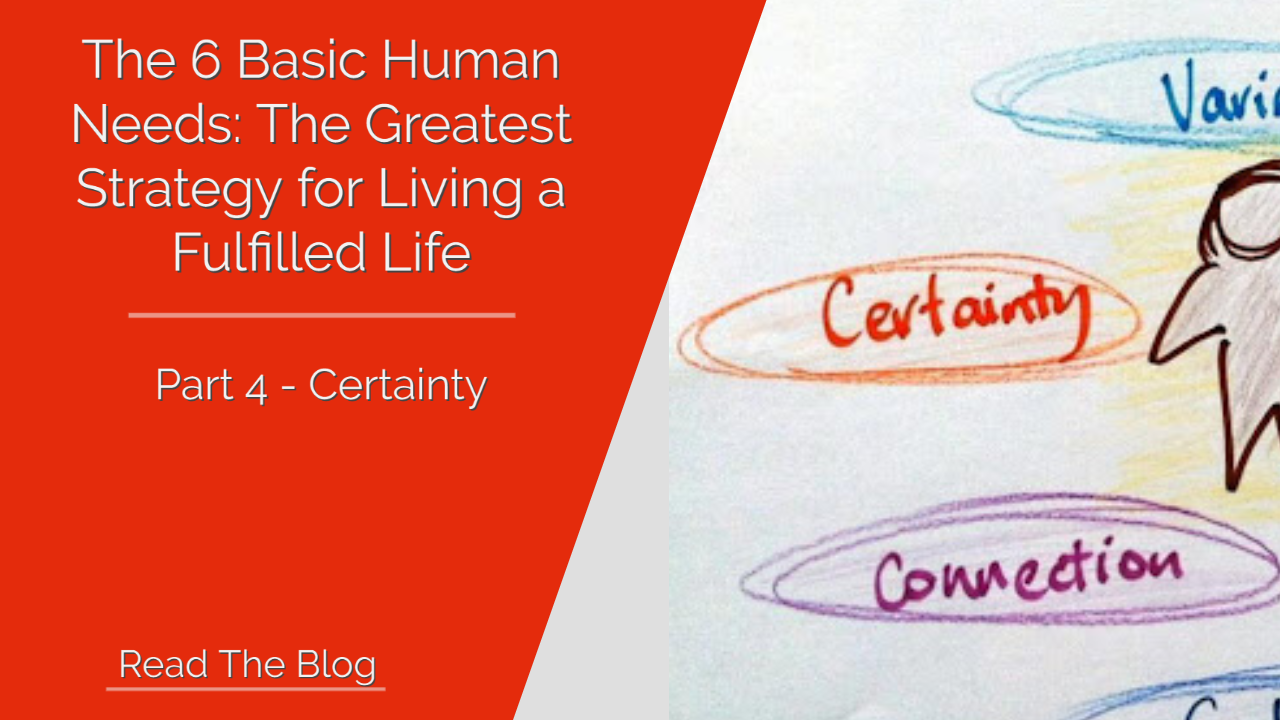Tony Robbins 6 Basic Human Needs: #4 The Need for Certainty
Dec 10, 2021
My mentor Tony Robbins adapted this theory into one of the best tools for life transformation: The Six Basic Human Needs Assessment. The needs are Love/Connection, Variety, Significance, Certainty, Growth, and Contribution. The first four needs are necessary for survival and successful life. The last two needs (growth and contribution), are necessary to experience a fulfilled life.
Take your FREE 6 Basic Human Needs Assessment today
The 6 Basic Human Needs Assessment finds your top core needs – and then explains how to improve and balance your life.
You’ll get your personal and detailed results and It’s 100% free. There are quite a lot of questions (84 to be exact), but seeing results is really worth it!
Today, we are going to talk about the core need for Certainty
IF YOUR FIRST NEED IS FOR CERTAINTY
Your Beliefs
I need to feel secure, safe, and comfortable and I need to make sure that I will be secure, safe and comfortable in the future. Avoiding pain is very important to me. I can’t be happy when I’m uncertain about things.
How this Belief Serves You
I avoid risks and I carefully plan for the future. I’m careful and I take care of myself. People know I am predictable. I know how to be organized.
The Principles You Can Lose Sight Of
The future is unpredictable; all we have is the present moment. Where there is no risk, there is no gain. It is possible to be uncertain about the future, yet happy in the present.
The Consequences of Losing Sight of This Principle
I limit my new experiences. I have trouble letting love flow when I don’t feel secure and comfortable. I have trouble involving myself with people for fear that they will cause me pain. People sometimes think that I’m controlling. I may seem unenthusiastic and even boring. I am predictable at the cost of being spontaneous.
Positive ways to fulfill your need for Certainty:
- having a roof over your head
- having enough food
- knowing how to obtain health care when needed
- knowing your neighbor won't attack
- job security
- marriage security
- security in family relations and friendships
Negative ways to fulfill your need for Certainty:
-
hoarding (brings a false Certainty that you'll never do without)
-
over-eating ( blood rushes to the stomach, you breathe deeply and harder, and feel alive)
-
smoking (you inhale more deeply and harder, waking you up, making you feel more alive)
-
trying to control others (example: trying to control your spouse out of fear of abandonment, failure, etc. so you feel safe/Certainty)
-
trying to manipulate others (same reason as above)
-
alcoholism (it's a certain/guaranteed way to relax, ease social situations)
-
complaining / always having a problem (brings certainty of attention and compassion)
-
micromanaging (brings certainty that things will be done your way)
-
withdrawing (brings certainty that you'll be missed or talked about, and may bring attention)being clingy towards your spouse/friend/child to make you feel Certainty
Why are the six basic human needs so important to understand?
It is important to understand they are not goals nor merely desires, but profound needs that underlie and motivate every choice, every belief, and every decision we make.
Each of us needs all 6 of the human needs, and we all do things (positive and Negative) to meet these needs.
- We all have the need for Certainty in our lives
- We all have the need for Uncertainty in our lives
- We all have the need for Love and Connection
- We all have the need to feel Significant in our lives.
- We all have the need for Growth in our life.
- We all have the need to have Contribution to our life.
These needs are not things that you can buy or give to yourself, but they are essential for your continued growth and development as a person. The concept of these needs was birthed by Sigmund Freud, contributed to by many psychologists over the years, and most famously pulled together by Brooklyn-born American psychologist Abraham Maslow (1908-1970). He proposed six basic human needs: physiological, safety, love/belonging, esteem, self-actualization, and transcendence.


